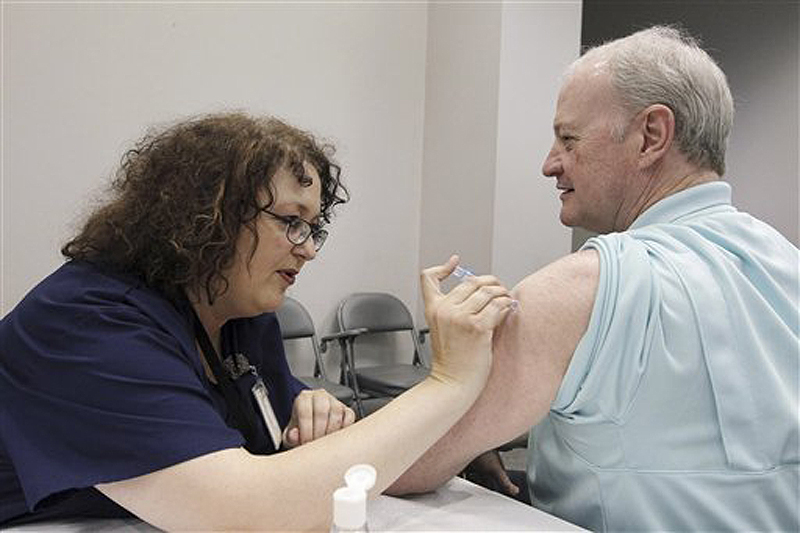CHICAGO – Patients can refuse a flu shot. Should doctors and nurses have that right, too? That is the thorny question surfacing as U.S. hospitals increasingly crack down on employees who won’t get flu shots, with some workers losing their jobs over their refusal.
“Where does it say that I am no longer a patient if I’m a nurse?” wondered Carrie Calhoun, a longtime critical care nurse in suburban Chicago who was fired last month after she refused a flu shot.
Hospitals’ get-tougher measures coincide with an earlier-than-usual flu season hitting harder than in recent mild seasons. Flu is widespread in most states, and at least 20 children have died.
Most doctors and nurses do get flu shots. But in the past two months, at least 15 nurses and other hospital staffers in four states have been fired for refusing, and others have resigned, according to affected workers, hospital authorities and published reports.
In Rhode Island, one of three states with tough penalties behind a mandatory vaccine policy for health care workers, more than 1,000 workers recently signed a petition opposing the policy, according to a labor union that has filed suit to end the regulation.
Why would people whose job is to protect sick patients refuse a flu shot? The reasons vary: allergies to flu vaccine, which are rare; religious objections; and skepticism about whether vaccinating health workers will prevent flu in patients.
Dr. Carolyn Bridges, associate director for adult immunization at the federal Centers for Disease Control and Prevention, says the strongest evidence is from studies in nursing homes, linking flu vaccination among health care workers with fewer patient deaths from all causes.
“We would all like to see stronger data,” she said. But other evidence shows flu vaccination “significantly decreases” flu cases, she said. “It should work the same in a health care worker versus somebody out in the community.”
Cancer nurse Joyce Gingerich is among the skeptics and says her decision to avoid the shot is mostly “a personal thing.” She’s among seven employees at IU Health Goshen Hospital in northern Indiana who were recently fired for refusing flu shots. Gingerich said she gets other vaccinations but thinks it should be a choice. She opposes “the injustice of being forced to put something in my body.”
Medical ethicist Art Caplan says health care workers’ ethical obligation to protect patients trumps their individual rights.
“If you don’t want to do it, you shouldn’t work in that environment,” said Caplan, medical ethics chief at New York University’s Langone Medical Center. “Patients should demand that their health care provider gets flu shots — and they should ask them.”
For some people, flu causes only mild symptoms. But it also can lead to pneumonia, and there are thousands of hospitalizations and deaths each year. The number of deaths has varied in recent decades from about 3,000 to 49,000.
A survey by CDC researchers found that in 2011, more than 400 U.S. hospitals required flu vaccinations for their employees and 29 hospitals fired unvaccinated employees.
At Calhoun’s hospital, Alexian Brothers Medical Center in Elk Grove Village, Ill., unvaccinated workers granted exemptions must wear masks and tell patients, “I’m wearing the mask for your safety,” Calhoun says. She says that’s discriminatory and may make patients want to avoid “the dirty nurse” with the mask.
The hospital justified its vaccination policy in an email, citing the CDC’s warning that this year’s flu outbreak was “expected to be among the worst in a decade” and noted that Illinois has already been hit especially hard.
The government recommends flu shots for nearly everyone, starting at age 6 months. Vaccination rates among the general public are generally lower than among health care workers.
According to the most recent federal data, about 63 percent of U.S. health care workers had flu shots as of November. That’s up from previous years, but the government wants 90 percent coverage of health care workers by 2020.
The highest rate, about 88 percent, was among pharmacists, followed by doctors at 84 percent, and nurses, 82 percent. Fewer than half of nursing assistants and aides are vaccinated, the CDC’s Bridges said.
Some hospitals have achieved 90 percent but many fall short. A government health advisory panel has urged those below 90 percent to consider a mandatory program.
Also, the accreditation body over hospitals requires them to offer flu vaccines to workers, and those failing to do that and improve vaccination rates could lose accreditation.
Starting this year, the government’s Centers for Medicare & Medicaid Services is requiring hospitals to report employees’ flu vaccination rates as a means to boost the rates, Bridges said. Eventually the data will be posted on the agency’s “Hospital Compare” website.
Several leading doctor groups support mandatory flu shots for workers. And the American Medical Association in November endorsed mandatory shots for those with direct patient contact in nursing homes; elderly patients are particularly vulnerable to flu-related complications.
Send questions/comments to the editors.



Success. Please wait for the page to reload. If the page does not reload within 5 seconds, please refresh the page.
Enter your email and password to access comments.
Hi, to comment on stories you must . This profile is in addition to your subscription and website login.
Already have a commenting profile? .
Invalid username/password.
Please check your email to confirm and complete your registration.
Only subscribers are eligible to post comments. Please subscribe or login first for digital access. Here’s why.
Use the form below to reset your password. When you've submitted your account email, we will send an email with a reset code.